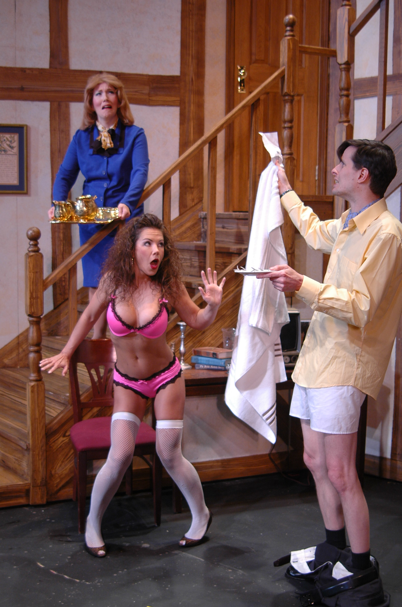People love Noises Off. Over the years I’ve heard many friends (theatre people especially) describe Michael Frayn’s backstage farce, currently getting a healthy workout at Theatre Memphis, as their favorite play. And over the years I’ve wondered “What in the hell is wrong with me for having a completely different reaction?”
It’s not that I don’t like Noises Off, I do. Quite a bit actually. But the second act moves like a mad pinball machine in multiball mode and makes me motion sick. When that ends I’ve usually had my fill of foolishness but the show romps on for a whole other act.
New York Times theatre critic Frank Rich once called Noises Off the funniest play written in his lifetime and, in a 1983 review of the show explained why he felt that way.
“It’s strangely involving to watch actors struggle heroically in a ludicrous play,” Rich wrote describing the most calamitous nights of theater as being nearly as memorable as the most successful. “When absolutely everything goes wrong on stage, as when everything goes right, we’re treated to drama that is urgent, spontaneous, unmistakably alive.”
True enough. But this, I think, may also be the source of my (admittedly irrational) discomfort. I’ve never enjoyed watching a play fall apart or seeing actors humiliated. But it happens all the time and there are moments when Noises Off, for all of its outlandishness, seems too much like just another crappy day at the office. I hate that too because, in theory, I’ve always seen Frayn’s play as something just a little grander than an opportunity for virtuoso clowning. It’s also an epic, Beckett-like metaphor for modern life where where there’s no God, just an egomaniac with a PA system; everybody is screwing everybody else (one way or another); and the biggest secret is that there are no secrets. It’s a play without heroes and in the end every character is dumped on: buried in the very curtain they live for.
Did I mention that there’s also no plot, only a situation? Noises Off opens during the final dress rehearsal of a dreadfully conceived sex farce called Nothing On. For act two the set is flipped to show the audience what goes on backstage on opening night. Act three is a full fledged actor’s nightmare, as the show falls completely apart weeks into a tour of the English countryside.
One truly awful (perhaps even unforgivable) thing about hiring Ann Marie Hall to direct Noises Off: She can’t be in it too. Hall’s one of Memphis’s best comic actors and anybody who missed her brief, brilliant turn in Opera Memphis’s Die Fledermaus missed something truly special. Harpo Marx would have been jealous. Mack Sennett too. Other than that, who better to helm a massive gag-fest filled with falling axes, trousers, and bodies?
Hall’s brought together a tight if slightly uneven ensemble that includes Tony Isbell as director Lloyd Dallas, Kim Justis as an aging comedienne who can’t remember her lines, Brian Everson as an actor for whom words always fail, and the great Barry Fuller as an ancient party boy whose love of drink causes all sorts of trouble.
Everson is an unassuming, and effective performer. He was one of the best things about Theatre Memphis’s flawed Importance of Being Earnest and the understatement that made him such a fine John Worthing works for him again here, even when there’s nothing understated about what his juvie male lead is asked to do.
Some actors have bad dreams about being naked on stage. The proudly curvaceous Melissa Walker Moore isn’t one of them. She’s fearless as a dim starlet cast only for her physical assets, her willingness to prance around in her skimpies, and a rigid ability to remember her lines and say them exactly (complete with ridiculously mechanical gestures) no matter what kind of hell is breaking loose around her.
One technical element kept me from enjoying act two as much as I might have. When the set is turned around a large picture window lets the audience see what’s happening onstage (now, technically backstage) while the “behind the scenes” action unfolds in front. Instead of respecting and avoiding the window, as actual backstage actors might, the characters sometimes just walk in front of the window as though it wasn’t effectively bringing them into the “action.” It made the suspension of disbelief difficult and in a play this wacky, that can’t happen. Judging by the laughter all around me, however, not everybody gets so hung up on these kinds of details.
So here’s the gist: I’m apparently doomed never to enjoy Noises Off. That’s my problem. It’s clearly a lot of fun for a lot of people.
Ticket info, here.
